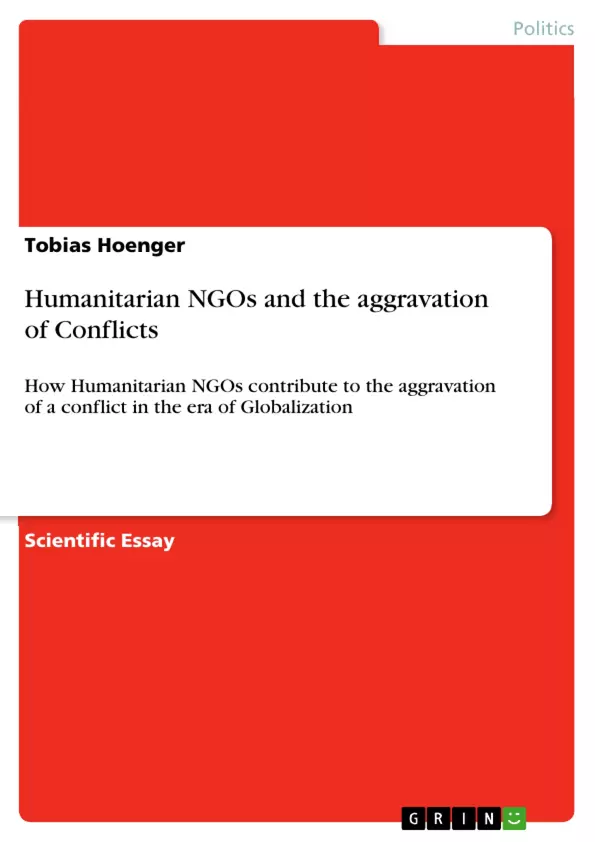NGOs often define their mission as a work with people who need help and cannot count on official government or foreign aid. NGOs in conflict settings have saved lives, protected human rights, helped in post-conflict development and more. However, NGO record is not without problems and in the age of growing conflict complexity and intractability, non- governmental organizations in transnational work are facing a major duty.
This paper aims to explore problems of NGOs working in or on a conflict. The literature on NGOs and conflict has been growing remarkable during the last years. A big part of the literature is dealing with conflict resolution or peace building activities of NGOs or in general non-state actors. Quiet smaller is the number of literature on negative impacts of NGOs on a conflict. Within those bibliographies we often find the negative impacts of humanitarian aid. In the light of the post-Cold War era, where NGOs gained importance in transnational politics, problems caused by NGOs should not be disregarded.
This leads to the question of this paper:
What are negative effects of humanitarian NGOs in Conflict intervention and how can they be minimized?
For addressing this question, this paper shows on first hand, impacts of the globalization process, which directly relates to the growing importance of NGOs. In a second step, it deals with the issue of NGOs involved in conflict. In that chapter also lies a first philosophical approximation of problems of the humanitarian debate. For a broader understanding, techniques of NGOs in conflict will be covered. Finally, specific negative impacts of humanitarian NGOs will be exposed within different dimensions. Once criticism has been exercised, there is (always) a need to give suggestions for improvement. What NGOs (and especially humanitarian NGOs) can do to overcome the negative impacts on a conflict, is considered as a major part of this paper.
Inhaltsverzeichnis (Table of Contents)
- Introduction.
- Effects of Globalization
- General understanding
- The emerge of a civil society.
- NGOs involved in Conflict
- Structure and Types of NGOs.
- Third party techniques in conflicts.
- Techniques in Post-conflict and Peacebuilding.
- The humanitarian debate
- Humanitarian response.
- Negative contributions of humanitarian NGOs.
- Neutrality and Accountability.
- Neutrality
- Accountability.
- Economic dimension.
- Social and society dimension
- Political dimension.
- Future tasks
- Conclusion.
Zielsetzung und Themenschwerpunkte (Objectives and Key Themes)
This paper examines the negative impacts of humanitarian NGOs in conflict intervention and explores potential ways to minimize those effects. The paper's primary objective is to understand how globalization has contributed to the growing prominence of NGOs and their involvement in conflict situations.
- The impact of globalization on the role of NGOs and the emergence of civil society.
- The challenges and complexities of NGOs operating in conflict zones.
- The ethical considerations and potential negative effects of humanitarian aid.
- The need for greater accountability and transparency within the NGO sector.
- The importance of developing strategies for minimizing the negative impacts of NGOs on conflict situations.
Zusammenfassung der Kapitel (Chapter Summaries)
- Introduction: The paper introduces the topic of humanitarian NGOs in conflict settings, highlighting their potential benefits while acknowledging their limitations. The author raises the question of how to minimize the negative effects of NGO interventions.
- Effects of Globalization: This section explores the broader context of globalization and its influence on the rise of NGOs. It examines the shifting roles of states and the emergence of transnational networks, including NGOs.
- NGOs Involved in Conflict: This chapter discusses the various types and structures of NGOs involved in conflict situations. It examines the techniques they employ for conflict management, peacebuilding, and humanitarian response.
- Negative Contributions of Humanitarian NGOs: This section delves into the potential negative impacts of NGO interventions, focusing on issues of neutrality, accountability, economic, social, and political dimensions. It presents a critical analysis of the humanitarian debate and highlights areas for improvement.
Schlüsselwörter (Keywords)
This paper focuses on the intersection of humanitarian NGOs, conflict intervention, globalization, civil society, neutrality, accountability, and the potential negative effects of humanitarian aid. The paper aims to contribute to the understanding of these key concepts and their complex interrelationships in a rapidly changing global landscape.
Frequently Asked Questions
Can humanitarian NGOs aggravate conflicts?
Yes, despite their good intentions, NGOs can sometimes negatively impact a conflict by inadvertently fueling the local economy of warring parties or compromising their neutrality.
What is the "humanitarian debate" regarding NGOs?
The debate centers on the challenges of maintaining neutrality and impartiality in complex conflict zones where aid can be manipulated by political actors.
How has globalization affected the role of NGOs?
Globalization has allowed NGOs to gain more prominence in transnational politics, often filling roles that states cannot or will not fulfill in conflict and development settings.
What are the economic risks of NGO intervention?
NGOs can disrupt local markets or provide resources that are seized or taxed by armed groups, potentially prolonging the conflict.
Why is accountability a problem for NGOs?
NGOs are often accountable to their donors rather than the people they serve, which can lead to interventions that don't align with local needs or have unintended negative consequences.
How can the negative effects of NGOs be minimized?
Strategies include improving transparency, ensuring better coordination with local communities, and adhering to strict codes of conduct regarding neutrality and conflict sensitivity.
- Citar trabajo
- MA Tobias Hoenger (Autor), 2013, Humanitarian NGOs and the aggravation of Conflicts, Múnich, GRIN Verlag, https://www.grin.com/document/263481



